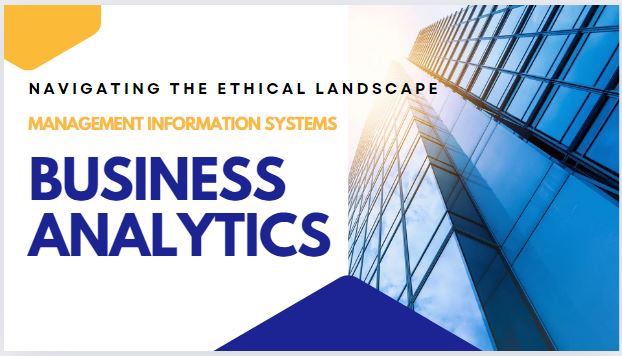
Introduction: The Intersection of Ethics and Technology
In today’s rapidly evolving digital landscape, the fusion of technology and business has become more intricate. Management Information Systems (MIS) is at the heart of this convergence, a field that has revolutionized how organizations collect, process, and utilize data. As businesses increasingly rely on data-driven decision-making, the demand for professionals well-versed in MIS and business analytics has skyrocketed. This surge in demand has given rise to specialized programs like the Online PGCM in Business Analytics, designed to equip students and working professionals with the skills needed to navigate this complex terrain.
However, with great power comes great responsibility. The ethical considerations surrounding MIS and business analytics are numerous and nuanced. As we delve deeper into this topic, we’ll explore the various ethical challenges that arise in the field of MIS, particularly in the context of business analytics, and how programs like the Online PGCM in Business Analytics are addressing these concerns.
The Ethical Minefield of Management Information Systems
Data Privacy: Walking the Tightrope
One of the most pressing ethical concerns in MIS is data privacy. As organizations collect vast amounts of personal and sensitive information, questions arise about how this data is stored, used, and protected.
- Who has access to this data?
- How long is it retained?
- What measures are in place to prevent data breaches?
These are just a few questions that MIS professionals grapple with daily. The PGCM in Business Analytics recognizes the importance of this issue and often includes modules on data governance and privacy regulations such as GDPR and CCPA.
Algorithmic Bias: The Hidden Prejudice
Algorithmic bias is another ethical concern that has gained significant attention in recent years. As machine learning algorithms become more prevalent in decision-making processes, there’s a growing risk of perpetuating and amplifying existing biases.
For instance, a recruitment algorithm trained on historical data might inadvertently discriminate against certain groups if the historical data reflects past biases. Students pursuing an Online PGCM in Business Analytics learn how to build these algorithms and identify and mitigate potential biases.
Transparency and Accountability in Business Analytics
The Black Box Problem
One of the challenges in advanced analytics and machine learning is the “black box” nature of some algorithms. As models become more complex, explaining how they arrive at their decisions becomes increasingly difficult.
This lack of transparency can be problematic, especially in industries where decisions must be explainable and justifiable. For example, if an algorithm denies a loan application in the financial sector, the applicant has the right to know why.
The Online PGCM in Business Analytics addresses this issue by teaching students about explainable AI and the importance of model interpretability. This knowledge is crucial for ensuring that analytics solutions are accurate but also transparent and accountable.
Responsible Reporting: The Power of Data Visualization
Another ethical consideration in MIS and business analytics is responsible data reporting. With the power of modern data visualization tools, it’s possible to present data in ways that can be misleading or manipulative.
For instance, a simple change in the scale of a graph can dramatically alter the perception of a trend. Students in the Online PGCM in Business Analytics learn how to create compelling visualizations and the ethical responsibilities that come with this power.
The Human Element: Balancing Automation and Employment
Job Displacement Concerns
As MIS and business analytics drive increased automation, there are valid concerns about job displacement. While these technologies can improve efficiency and productivity, they can also lead to the elimination of specific job roles.
This raises ethical questions about the responsibility of organizations towards their employees and society at large. Should companies prioritize efficiency gains over job preservation? How can they balance these competing interests?
The Online PGCM in Business Analytics often includes discussions on the societal impact of automation and the importance of continuous learning and skill development in the face of technological change.
The Digital Divide: Ensuring Equal Access
Another ethical consideration is the potential widening of the digital divide. As businesses become more data-driven, there’s a risk that those without access to advanced analytics tools or the skills to use them may be left behind.
This is particularly relevant in the context of small businesses or developing economies. Programs like the Online PGCM in Business Analytics are crucial in democratizing access to these skills, allowing a more comprehensive range of individuals to participate in the data-driven economy.
Ethical Decision-Making Frameworks in MIS
The Importance of Ethical Frameworks
Given the complex ethical landscape of MIS and business analytics, professionals in this field must have robust ethical decision-making frameworks. These frameworks provide a structured approach to navigating ethical dilemmas.
The Online PGCM in Business Analytics often incorporates case studies and ethical scenarios to help students develop moral reasoning skills. Some common frameworks include:
- Utilitarian Approach: Focusing on the consequences of actions and striving for the greatest good for the most significant number.
- Rights Approach: Emphasizing the fundamental rights of individuals and ensuring these are not violated.
- Fairness Approach: Striving for equitable treatment and distribution of benefits and burdens.
Cultivating Ethical Leadership
Beyond individual decision-making, there’s also a need for ethical leadership in the field of MIS and business analytics. Leaders must set the tone for their organizations, establishing policies and cultures and prioritizing ethical considerations.
The Online PGCM in Business Analytics often includes leadership and organizational behavior modules, helping students understand how to foster ethical cultures within their teams and organizations.
The Role of Regulation in Ethical MIS Practices
Keeping Pace with Technological Advancements
As technology evolves rapidly, regulations often need help to keep up. This creates a challenging environment for MIS professionals navigating an uncertain regulatory landscape.
Students in the Online PGCM in Business Analytics learn about current regulations governing data use and privacy. Still, they also develop the critical thinking skills needed to anticipate and adapt to future regulatory changes.
Self-regulation and Industry Standards
Many industries have developed their ethical standards and best practices without comprehensive regulations. For example, the IEEE has published guidelines for ethically aligned design in AI systems.
Understanding these industry standards is integral to the Online PGCM in Business Analytics curriculum, preparing students to be responsible practitioners in their field.
Conclusion: Embracing Ethical Responsibility in the Digital Age
As we’ve explored, the Management Information Systems and business analytics field is rife with ethical considerations. From data privacy and algorithmic bias to job displacement and the digital divide, professionals in this field must grapple with complex moral dilemmas on a regular basis.
Programs like the Online PGCM in Business Analytics are crucial in preparing the next generation of MIS professionals to navigate this ethical landscape. By combining technical skills with moral reasoning and understanding the broader societal impacts of technology, these programs help create well-rounded professionals who can drive innovation while upholding ethical standards.
As we move further into the digital age, the importance of ethical considerations in MIS will only grow. It’s not enough to be technologically proficient; true leaders in this field must also be ethically conscious and socially responsible.
Whether you’re a student considering a career in this field or a working professional looking to upgrade your skills, remember that with the power of data and analytics comes the responsibility to use that power ethically. By embracing this responsibility, we can ensure that the future of business analytics is profitable but also fair, transparent, and beneficial to society.


